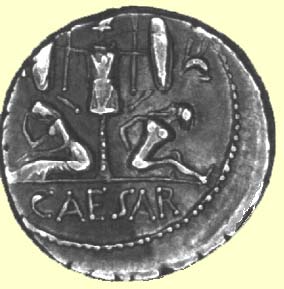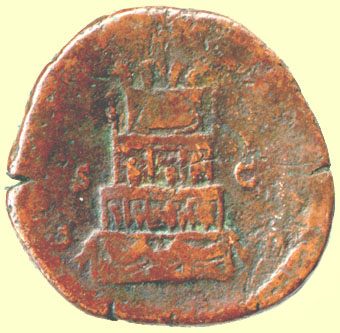 Contents -
Previous Article -
Next Article
Contents -
Previous Article -
Next Article
Julius Caesar
Imperator and Dictator 61 - 44 B. C.
"I came, I saw, I conquered!"
These words express the incredibly strong will and no-nonsense attitude of one of history's most famous men. Julius Caesar was courageous and quick-witted. He was also very good with people. But most of all, he was a gambler who knew how to calculate the odds. Willing to stake everything he had, including his life on a chance to win big in the game of politics and war, he was very sure of himself even to the point of being arrogant on occasion. The story is told how he was captured by pirates while still a young man only twenty-two years old. They planned to ransom him for twenty talents of gold but he explained that he was worth much more. The pirates agreed and increased his ransom to fifty talents. While he was their prisoner, he would read to them from books of Roman and Greek literature. When they showed nothing but scorn for him and his books, Caesar promised to hunt them all down and put them to death after he was ransomed. The pirates should have killed him right there instead of laughing at him as if he were a little banty rooster strutting about making threats. Julius Caesar made good on his promises, though. After he was released, Caesar borrowed a ship from the governor of a nearby island and hunted down his captors. After defeating them, he crucified the whole band, leaving them to die of thirst hanging naked on crosses in the hot Mediterranean sun.
Julius Caesar's most famous accomplishments include the conquest of Gaul and the invasion of Britain. The continuous pattern of civil war that had plagued the Roman Republic continued during the time of Julius Caesar, and he was a major player in the struggles for power. He defeated his major rival Cnaeus Pompey in 48 B.C. at the Battle of Pharsalus. Because he continued to concentrate so much power in his own hands that traditionally belonged to the Senate, Caesar faced steadily growing opposition from the senators of Rome. Many of them believed that he would put an end to the Republic and that he was a threat to all that Roman traditions held dear. A band of conspirators succeeded in assassinating him in 44 B.C., but his memory remained extremely popular amongst the common people of Rome. This paved the way for his adopted relative Octavian to gain power and become the first Roman emperor.
After Caesar's death, there was a curious mixed reaction amongst the Roman people. Traditionally, Romand abhorred and detested the idea of kingship, and anyone who gave the impression of supporting a monarchy or aspiring to rule as king became extremely unpopular. This is an attitude that went way back to the founding of the Republic. Since Julius Caesar was a dictator, he alienated those citizens with strong traditional republican views. On the other hand, Caesar was an extremely popular man, especially amongst the army, the people, and his veterans. It is a curious twist of Roman psychology (not altogether absent in our own society) that the people probably were glad that Caesar was safely dead but wanted to honor and grieve for their fallen hero!
 Although it might seem to us that dragging a corpse to the Forum and burning it would be a sign that the person is hated and despised, this was actually a way of greatly honoring the deceased. The funeral pyre and public funeral was the accepted way to bury great men. After Caesar's death, Marc Antony gave a speech that has become famous in history. "We have come not to bury Caesar, but to honor him...", it began. In a show of public grief, the Roman people dragged Caesar's corpse to the Forum and burned it, showing the ultimate respect for the man. It is probably no accident that this speech also made Antony extremely popular as a friend of the dead Caesar.
Although it might seem to us that dragging a corpse to the Forum and burning it would be a sign that the person is hated and despised, this was actually a way of greatly honoring the deceased. The funeral pyre and public funeral was the accepted way to bury great men. After Caesar's death, Marc Antony gave a speech that has become famous in history. "We have come not to bury Caesar, but to honor him...", it began. In a show of public grief, the Roman people dragged Caesar's corpse to the Forum and burned it, showing the ultimate respect for the man. It is probably no accident that this speech also made Antony extremely popular as a friend of the dead Caesar.
The image at above left shows the a very elaborate funeral pyre for an emperor on the reverse of a sestertius of Antoninus Pius. Although Caesar's funeral was probably hastily and impulsively carried out by the citizens, this image shows what the Romans considered to be a funeral worthy of a great man. The body was laid in state on the top floor. The pyre is constructed of wood and was usually three stories high. A cage on top held doves, which were released just before the pyre was lighted. Their flight symbolized the dead man's soul ascending to heaven.
Go to next article on Brutus
Go back to previous article on Sextus Pompey
Return to Roman Emperors Table of Contents
 Although it might seem to us that dragging a corpse to the Forum and burning it would be a sign that the person is hated and despised, this was actually a way of greatly honoring the deceased. The funeral pyre and public funeral was the accepted way to bury great men. After Caesar's death, Marc Antony gave a speech that has become famous in history. "We have come not to bury Caesar, but to honor him...", it began. In a show of public grief, the Roman people dragged Caesar's corpse to the Forum and burned it, showing the ultimate respect for the man. It is probably no accident that this speech also made Antony extremely popular as a friend of the dead Caesar.
Although it might seem to us that dragging a corpse to the Forum and burning it would be a sign that the person is hated and despised, this was actually a way of greatly honoring the deceased. The funeral pyre and public funeral was the accepted way to bury great men. After Caesar's death, Marc Antony gave a speech that has become famous in history. "We have come not to bury Caesar, but to honor him...", it began. In a show of public grief, the Roman people dragged Caesar's corpse to the Forum and burned it, showing the ultimate respect for the man. It is probably no accident that this speech also made Antony extremely popular as a friend of the dead Caesar.
 Contents -
Previous Article -
Next Article
Contents -
Previous Article -
Next Article